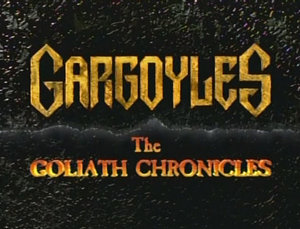Difference between revisions of "The Goliath Chronicles"
| Line 7: | Line 7: | ||
According to Weisman, the original crew "had considerable freedom the first two years" because ''Gargoyles'' was a syndicated series, while ''Chronicles'' "was network and had much tougher standard and practices rules." Weisman also stated that, "Part of the problem was that the staff of ''Chronicles'' took springboards I came up with and then went WAY south with them." For example, the episode "[[And Justice For All]]" was based on Weisman's plan for Goliath to be on trial for his sentience, but in the actual episode he was on trial for robbing a jewelry store. Much of this may be due to the fact that the team working on ''Chronicles'' had very little time to familiarize themselves with the original show before they began production, badly hindering their efforts. | According to Weisman, the original crew "had considerable freedom the first two years" because ''Gargoyles'' was a syndicated series, while ''Chronicles'' "was network and had much tougher standard and practices rules." Weisman also stated that, "Part of the problem was that the staff of ''Chronicles'' took springboards I came up with and then went WAY south with them." For example, the episode "[[And Justice For All]]" was based on Weisman's plan for Goliath to be on trial for his sentience, but in the actual episode he was on trial for robbing a jewelry store. Much of this may be due to the fact that the team working on ''Chronicles'' had very little time to familiarize themselves with the original show before they began production, badly hindering their efforts. | ||
| − | Story editor [[Eric Lewald]] was concurrently the story editor on ''X-Men: The Animated Series'' (1992-1997), while working on this show, which may be the reason why both shows shared many of | + | Story editor [[Eric Lewald]] was concurrently the story editor on ''X-Men: The Animated Series'' (1992-1997), while working on this show, which may be the reason why both shows shared many of the same writers. With the exception of Greg Weisman, [[Cary Bates]] and [[Lydia Marano]], all the writers on The Goliath Chronicles wrote for ''X-Men''. [[Jan Strnad]], [[Julia Lewald]], [[Mark Edward Edens]], [[Brooks Wachtel]], [[Len Uhley]], and [[Len Wein]] wrote multiple episodes of ''X-Men'', while [[Steve Cuden]] and [[Adam Gilad]] (who had written four episodes for ''Gargoyles'') wrote one ''X-Men'' episode each. |
Despite this, a piece of dialogue from the ''Chronicles'' episode "[[The Dying of the Light]]" was adapted into the SLG issue "[[Bash]]". Greg Weisman felt that "a nod to one of the times they got things right was a nice tribute to all the hard work that the TGC crew put in, with little thanks or reward."[http://www.s8.org/gargoyles/askgreg/search.php?qid=9873] | Despite this, a piece of dialogue from the ''Chronicles'' episode "[[The Dying of the Light]]" was adapted into the SLG issue "[[Bash]]". Greg Weisman felt that "a nod to one of the times they got things right was a nice tribute to all the hard work that the TGC crew put in, with little thanks or reward."[http://www.s8.org/gargoyles/askgreg/search.php?qid=9873] | ||
Revision as of 11:12, 24 August 2011
The Goliath Chronicles was the name of Gargoyles' third season. Whereas the first two seasons had aired in the afternoon in syndication, as part of "Disney Afternoon", Chronicles aired on Saturday mornings on the American Broadcasting Network (ABC, which had recently been acquired by The Walt Disney Company). The series originally aired between 7 September 1996 and 15 February 1997. The series was known as The Goliath Chronicles because Goliath would give a short monologue at the beginning and end of each episode.
After the first episode, "The Journey", all the producers and story editors (including series creator Greg Weisman), along with most of the other crew, were replaced. The following twelve episodes were poorly received by most of the fans, for various reasons including poor characterization and continuity. As a result, it is not considered to be canon, and was ignored when series creator Greg Weisman later continued the Gargoyles storyline through Slave Labor Graphics' comic book series.
According to Weisman, the original crew "had considerable freedom the first two years" because Gargoyles was a syndicated series, while Chronicles "was network and had much tougher standard and practices rules." Weisman also stated that, "Part of the problem was that the staff of Chronicles took springboards I came up with and then went WAY south with them." For example, the episode "And Justice For All" was based on Weisman's plan for Goliath to be on trial for his sentience, but in the actual episode he was on trial for robbing a jewelry store. Much of this may be due to the fact that the team working on Chronicles had very little time to familiarize themselves with the original show before they began production, badly hindering their efforts.
Story editor Eric Lewald was concurrently the story editor on X-Men: The Animated Series (1992-1997), while working on this show, which may be the reason why both shows shared many of the same writers. With the exception of Greg Weisman, Cary Bates and Lydia Marano, all the writers on The Goliath Chronicles wrote for X-Men. Jan Strnad, Julia Lewald, Mark Edward Edens, Brooks Wachtel, Len Uhley, and Len Wein wrote multiple episodes of X-Men, while Steve Cuden and Adam Gilad (who had written four episodes for Gargoyles) wrote one X-Men episode each.
Despite this, a piece of dialogue from the Chronicles episode "The Dying of the Light" was adapted into the SLG issue "Bash". Greg Weisman felt that "a nod to one of the times they got things right was a nice tribute to all the hard work that the TGC crew put in, with little thanks or reward."[1]
